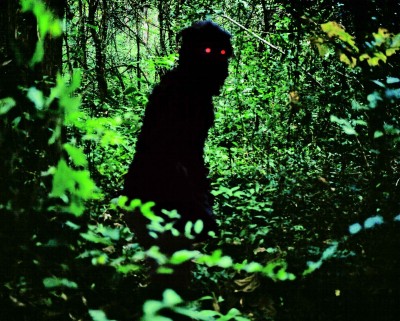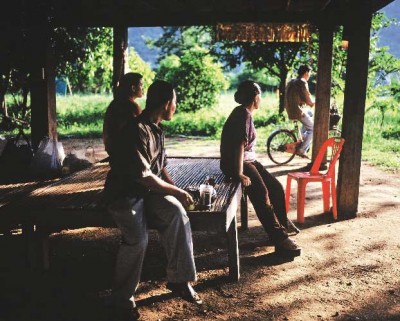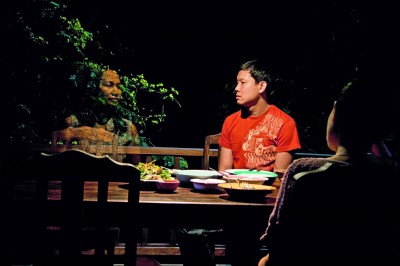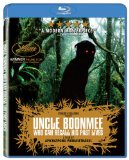| Reviews & Columns |
|
Reviews DVD TV on DVD Blu-ray 4K UHD International DVDs In Theaters Reviews by Studio Video Games Features Collector Series DVDs Easter Egg Database Interviews DVD Talk Radio Feature Articles Columns Anime Talk DVD Savant Horror DVDs The M.O.D. Squad Art House HD Talk Silent DVD
|
DVD Talk Forum |
|
|
| Resources |
|
DVD Price Search Customer Service #'s RCE Info Links |
|
Columns
|
|
|
Uncle Boonmee Who Can Recall His Past Lives

Please Note: The images used here are promotional stills from the film and are not taken from the blu-ray.
Apichatpong Weerasethakul's Uncle Boonmee Who Can Recall His Past Lives--which last year succeeded Michael Haneke's The White Ribbon and preceded Terence Malick's The Tree of Life in a proud lineage of Cannes Palme d'Or winners--is a film that exists, entrancingly, on several planes simultaneously. Its core story is a very simple one about the difficult but well-known familial experience of losing an aging and/or ailing relation, and it provides a sort of through-line for the film. But, in a virtually alchemical process familiar to those who know Weerasethakul's work, he teases out all of that story's latent complexities and associations on the levels of memory, emotion, time, space, and culture, taking the film to magnificently inventive, intuitive places we could never have expected and marking it as one of the freshest, most unpredictable cinematic experiences imaginable.
After a brief pre-title "prologue" in which an escaped bull seems to travel nonchalantly from the present to the distant past and is observed by some shadowy, gorilla-like creatures whose bright red eyes shine out (kindly? menacingly?), piercing the dark like crimson fireflies, the film opens on a car being driven through the late-afternoon sunlight of Thailand's serene, spacious countryside. Inside the car is a middle-aged woman, Auntie Jen (Jenjira Pongpas), and a young man, her nephew, Tong (Sakda Kaewbuadee); they are traveling from the city to visit Auntie Jen's widowed brother-in-law, Uncle Boonmee (Thanapat Saisaymar), who lives on a tamarind farm, where he manages his immigrant workers (from Laos, whose politically and historically significant border is nearby), raises bees, and waits to die of a kidney disease that requires daily dialysis, which is performed for him by another Laotian helper, Jaai (Samud Kugasang). In this rural setting, the reunited relatives make small talk, reminisce, and generally get reacquainted after an extended time apart, with Boonmee on his farm and Jen and Tong residing in what he calls "that city from hell" (teeming Thai metropolis Bangkok?). Later, as they are eating their dinner out on Boonmee's enclosed porch, surrounded by the nighttime sound of chirping crickets (and, possibly, other, less familiar creatures), the ghost of Jen's sister and Boonmee's wife, Huay (Natthakam Aphaiwong), suddenly yet casually fades into an empty chair at the table, joining, to the family's strangely mild surprise, the meal in progress. This is clearly not going to be a film that draws sharp distinctions between this life and the next one, and things are shortly taken even further into surreal territory when the family receives another unexpected, departed visitor, who lets himself in and takes the remaining seat. This time, it is Boonmee and Huay's son, Boonsong (Geerasak Kulhong), whom they do not recognize at first because he has become one of the "monkey ghosts"--the creatures with the red eyes--that we recognize from the prologue sequence.

What follows grows, wondrously, ever stranger. The film seems to consist of discrete but connected sections that it progresses through without clearly demarcating where one ends and the other begins (blurring narrative, chronological, and various other cinematic boundaries is obviously an important, recurrent practice for Weerasethakul). Most of the film still retains the Jen/Boonmee/Tong characters as constants, but some sequences are related to the "main" story in ways we can only guess at. One of these, in which Uncle Boonmee relates a dream he had about the future, is a montage of stills that gorgeously and delightfully pays homage to Chris Marker's extraordinary La Jetée. Another particularly out-of-left-field portion, the film's striking "center" (chronologically and, perhaps, thematically), whisks us suddenly very far away (or so it would seem) from the story we have been following. This section, set in a long-distant past, has the feel of a myth, legend, or fairytale and tells the story of a princess who is, to her sorrow, growing old. She is conveyed to an isolated waterfall/pond in which she views a reflection of herself as a younger woman, and where she is renewed (and romanced!) by a talking catfish. I am no expert in Asian cultures, and unless you do happen to be one, there is really no telling whether this is the traditional, culturally specific fable it seems it could be. The last present-day shot we see before delving into the princess's story depicts Tong reclining in a hammock; is the tale of the princess his dream? One of Uncle Boonmee's past lives? Both? This is but one of the film's captivating, enchanting, unsolved mysteries.

Weerasethakul's visual sense (aided in its realization by his longtime cinematographer, Sayombhu Mukdeeprom, who also shot Weerasethakul's last feature, Syndromes and A Century) is just superb. He brings a fine sense of exquisitely simple beauty to every frame and manages to let his images just be in all their meticulous but not at all ostentatious glory; they remain integral to the feel and tone of the film's storytelling at the same time they impress themselves upon our consciousness with their quiet, unassuming perfection. To use as a point of reference a filmmaker more widely known in the English-speaking world, Uncle Boonmee has some salient technical and artistic parallels with David Lynch's great Mulholland Drive. There is, most obviously, its persistent refusal to make any rational sense at the same time it makes precise, overwhelming emotional sense, which will provoke endless discussions of its "meaning" and no small number of mutterings about its supposed inscrutability. But there is also Weerasethakul's absolutely ingenious, indelible use of sound. Unlike Lynch, Weerasethakul has no Angelo Badalementi-like musical-score muse and uses virtually no non-diegetic music. But there are sonic dimensions to Uncle Boonmee that could best be described as Lynchian--layer after layer of sound that encompasses crickets chirping; naggingly familiar yet hard-to-place nature sounds that envelop some scenes; and persistent, deep, ominous, almost subliminal bottom sounds buoying many scenes' sense of expectation, unfamiliarity, or suspense. Not since Lynch's strikingly successful sonic experimentation has a film's sound design seemed quite this carefully crafted or such a well-considered, absolutely essential, entirely integrated part of the proceedings.

There is no doubt that Uncle Boonmee is extremely and unabashedly loose when it comes to plot, and it stubbornly follows its own unique, demanding storytelling logic. It is challenging in any case, which many viewers will appreciate as part of its appeal; however, just as fair warning, if you tend to say a film is "slow" and mean that descriptor as an automatic, self-evident criticism--or if you are insistent upon conventional cause-and-effect explanations of events and clearly spelled out relationships between characters, settings, and actions--then you are bound to be frustrated by Weerasethakul's masterpiece, which is distinguished by its sense of intoxicating, lingering mystery and the integrity with which its creator has kept it true, in form and content, to its curious, odd, often puzzling, always exhilarating vision.
THE BLU-RAY:
Uncle Boonmee Who Can Recall His Past Lives is a film whose every visual detail is exactingly conceived and executed, and Strand's very careful, very faithful transfer (mastered at 1080p/MPEG-2 and presented anamorphically in its original theatrical aspect ration of 1.85:1) preserves every last one of those details so that we can experience Weerasethakul's stunning visual sensibility in full. Every color is pure and vivid, all the contrast and shadow comes through crystal-clear and well-textured, and the film's many quite subtly lit nighttime/dark scenes still convey all their original visible detail. I saw this film projected in a cinema, and it did not look nearly as good there as it does on blu-ray. The film's visuals themselves are superlative, and those responsible for this transfer have really done right by them here.
Sound:Strand has released Uncle Boonmee on blu-ray with both Dolby Digital 2.0 and Dolby Digital 5.1 soundtracks (in Thai, with English subtitles that are acceptably accurate and well-designed so as not to become invisible against the background). Both soundtracks preserve the integrity of the film's deep, rich, subtle sound design, but I should note that, though the 2.0 is perfectly sufficient if your setup limits you to that, this is a film with an aural dimension so conscientiously, artistically shaped and so vital to the film as a whole that viewing it with the 5.1 soundtrack, if at all possible, would actually make a noticeable difference and be the preferable option.
Extras:A Letter to Uncle Boonmee, an 18-minute short by Weerasethakul from 2009, also shot by Sayombhu Mukdeeprom, and apparently made as a preliminary/precursor to Uncle Boonmee Who Can Recall His Past Lives. An unnamed character (one might guess Weerasethakul himself) meditates on his desire to make a film that will be a tribute to the late Uncle Boonmee and, at the same time, and ponders the inevitability of creative impulses and filmmaking logistics and will inevitably making it something other than a direct retelling of Boonmee's life and its real places, people, and events (including the loaded, violent history of the Thai village of Nabua). This short work, initiating the line of creative exploration Weerasethakul then followed through Uncle Boonmee Who Can Recall His Past Lives, makes for a relevant and interesting adjunct to the main feature.
Oncle Apichatpong, a 20-minute video interview (in English) with French journalist Bertrand Loutte, in which the director discusses his film in considerable depth and detail without trying to explain what is essentially an inexplicable (and all the better for it) work of art. Weerasethakul is lucid, intelligent, and mild-mannered, and the interview is shot in such a way (alone with the director, in a quiet restaurant, surrounded by Buddha statues) that we feel like we are having a casual, personal chat with him about the film.
Almost 30 minutes of deleted scenes from the film show us some of the interesting little turns it could have taken and places it could have gone; these scenes are both a revelation of Weerasethakul's shaping and honing process for the final cut, as well as cinematically very gratifying on their own, showcasing once more the auteur's formidable compositional, framing, lighting, and sound techniques. Rounding out the extras are trailers for three other Weerasethakul films--Blissfully Yours, Tropical Malady, and Syndromes and a Century--as well as a handful of other Strand releases (this could serve as your reminder to watch Lucretia Martel's The Headless Woman if you haven't yet had the privilege).
FINAL THOUGHTS:Elliptical, mesmerizing, and deeply affecting, Apichatpong Weerasethakul's Uncle Boonmee Who Can Recall His Past Lives is an unqualified achievement and reaffirmation of Weerasethakul's importance to the future of world cinema. It is an extraordinarily enigmatic film, one in which past, present, future, living, dead, human, and animal coexist, overlap, and intersect with the utmost casualness, which is disorienting at first and breathtakingly impressive in the end. One cannot really make rational sense of it, but at the levels of its artistry and its visual/aural/emotional sensibility, it is seamless, a work whose profundity and quiet, placid power make it vital, transformative viewing that could permanently alter the way you think of film as a medium. Highly Recommended.
|
| Popular Reviews |
| Sponsored Links |
|
|
| Sponsored Links |
|
|
| Release List | Reviews | Shop | Newsletter | Forum | DVD Giveaways | Blu-Ray | Advertise |
|
Copyright 2024 DVDTalk.com All Rights Reserved. Legal Info, Privacy Policy, Terms of Use,
Manage Preferences,
Your Privacy Choices | |||||||












